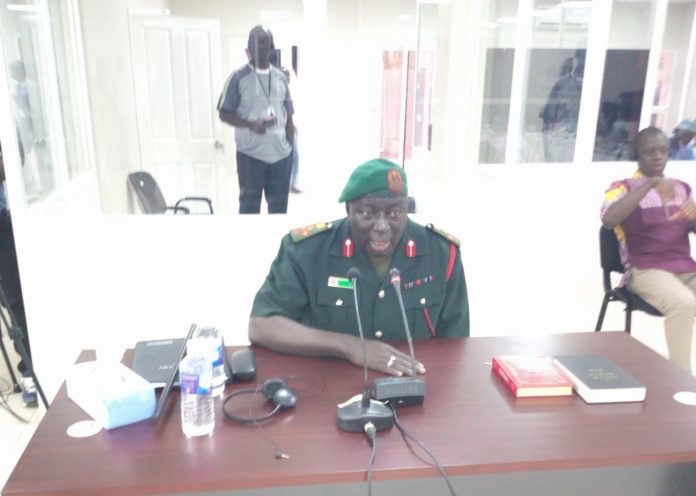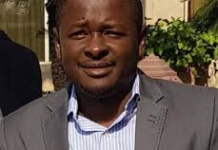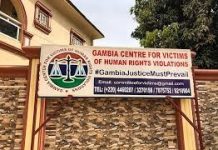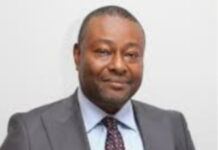By Yankuba Jallow
General Mamat O. Cham, an erstwhile member of the 1994 military has told the TRRC that Honourable Halifa Sallah and Samuel Sarr of the PDOIS as well as Lawyer Ousainou Darboe and Swaebou Conteh, a veteran journalist all refused offer by the military junta to hold ministerial positions.
General Cham at the time of the coup was a captain and a senior to the coup makers. He said the junta had a list of civilians among whom some accepted ministerial positions.
“I was given the order to approach the civilians to offer them ministerial positions but the final decision was made by the Council,” he said.
Cham was speaking on Wednesday the 16th January 2019, before the Truth Reconciliation and Reparations Commission. Cham has served briefly as a minister of tourism and culture under the Junta.
He said Honourable Sallah was offered Minister of Health and Social Welfare, Samuel Sarr was offered Minister of Agriculture and Lawyer Ousainou Darboe was listed as the Minister of Justice. He said he was the person assigned by the Junta to meet the civilians in the list to offer them the various ministerial positions based on the person’s area of specialization.
In his testimony, he stated that Lawyer Darboe refused to welcome them to their home.
“We went to his home but he refused to open the door for us to enter,” he said.
“When I approached Halifa Sallah and Sam Sarr of the PDOIS, they didn’t reject the offer outright but they failed to show up before the deadline given to them. I think it was a civilized way of rejecting an offer. They showed up late at the State House after all positions were given,” he said.
For Conateh, the witness said Conateh refused the offer and told him that he wanted to focus on a business that he planned to embark on.
He said Justice Fafa Mba’I accepted the offer of becoming the Minister of Justice but pleaded to the Junta to delay the announcement until he returns from his trip from the United Kingdom.
The 58-year old soldier said he was enlisted in the Gambia National Army (GNA) on the 16th July 1984. He explained that he had risen to different ranks within the GNA including 2nd Lieutenant, Platoon Commander, Adjutant Officer at the Yundum Barracks and Commander among others. He also stated that he was sent to Liberia under a peacekeeping mission and he was the Camp Commander. He said he had also served as a staff officer at the Defence Headquarters.
He elucidated that he succeeded Captain Wilson as the Platoon Commander in Kartong after he had imposed a curfew in the village in an aftermath of a football match between the soldiers and the civilians which did not end well.
He revealed that there was a mutiny that was held by group soldiers who were sent to Liberia and that they were claiming for their allowances to be paid. According to him, the incident was peaceful and the soldiers did the mutiny by abstaining from work.
“I think they were 60 to 80 soldiers or thereabout,” he said.
He said the soldiers were persuaded to stop the mutiny and after they were addressed by their seniors, some of them were arrested and taken to Mile II Prisons.
“We screened them and those we found to be the instigators were arrested and taken to Mile II,” he explained.
He said Colonel Ndow Njie, the then leader of the GNA was made the ambassador of the Gambia to France and Major Maba Jobe replaced him as the interim leader. He affirmed that this had prompted the government of the Gambia to look for an alternative because at that time there were no seasoned officers to command the GNA. He added the government of the Gambia talked to General Babangida, an ex-president of the Federal Republic of Nigeria to send in soldiers to help build a better GNA where there will be continuity. He said the Nigerians came as NATAG (Nigerian Army Training and Advisory Group).
He said Colonel Ndow Njie was a trained police officer but not an army officer but he was the one commanding the GNA.
“An army requires a leader who is mature and knows the situation of the country so that there can be continuity. There was maturity gap in the army,” he said.
He said the NATAG made some achievements including the development of the Gambia Armed Forces Act; establishment of the Terms and Condition of Services and re-structuring of the GNA to ensure continuity.
He said in the morning on the 22nd July 1994, he boarded a private vehicle owned by Captain Ebrima Kambi to go to Banjul to assume his duties. He said Captain Ben Wilson was also in the car. He explained that when they reached the Sting Corner, the realized that the traffic was congested and they decided to drive along the sideway of the road to reach Banjul.
He said when they were about 200 metres from the Denton Bridge, they met a group of armed soldiers who were in a state of disorder and aggressive and they sealed the Bridge at the Serrekunda end. He added that the soldiers asked them to join their leaders, 2nd Lieutenant Edward Singhatey and 2nd Lieutenant Sanna Sabally who were the leaders of the coup.
He said at this point, they drove to Fajara Barracks where they found out that the camp was already in support of the coup makers.
“They asked us to join their leaders in the coup,” he said.
He added that they proceeded to the two senior Nigerian colonels at Kotu to discuss the situation. He said at this time, Colonel Abubacarr Dada was out of the country and those two Colonels were the senior among the Nigerian soldiers. He said after their discussion with the two colonels, they requested from Colonel Salik, who was the commander at the Farafenni camp to send in a reinforcement troop to stop the coup.
“There was logistics problem. There was no transportation to bring these soldiers to Barra from Farafenni. They used trucks owned by people to reach Barra. They reached the State House on Saturday the 23rd July 1994, a day after the coup,” he said.
He said the Nigerian officers said this is an internal states affair.
“The Nigerian soldiers left the matter of the coup entirely in our hands,” he said.
He expounded that he left the Colonels’ home for the Marine Unit in Banjul where they met Major Antouman Saho who told them that the State House has already been overthrown by the said soldiers.
He said the Nigerian Colonels at the time he was leaving for Banjul told him to make sure that there is order and peace and in the case the coup succeeds, they should ensure that they form a government.
He said at this juncture, he left for the State House where he met Edward Singhatey who told them that they needed him.
“Edward told me that I should have liberated the country but I told him that I didn’t join the army for that,” the witness adduced.
He said at the time he met Jammeh at the State House, Jammeh was wearing jujus crisscross on his uniform.
“They did not ask me to join but Edward told me that they have taken over the country and that they were looking for me because they have no further plans,” he said.
He said at the State House, he met Captain Suwareh, Captain Samsideen Sarr, Lieutenant Yaya Jammeh, 2nd Lieutenant Edward Singhatey and Captain Momodou Sonko.
“Myself and Samsideen Sarr eventually guided the decision of forming a council,” he said.
He said whilst they were holding a meeting at the State House, 2nd Lieutenant Sanna Sabally came in and obstructed the meeting.
“Sanna told us that monkey will not work and baboon eats. Sanna expressed dissatisfaction for us holding a meeting without his presence,” the witness said.
He said Yaya Jammeh and Edward Singhatey took him aside and held discussions with him.
“After their discussion, they told us that the idea of forming an 11 man council is suspended and that we should be engaged in more practical issues,” General Cham said.
The witness assumed there were no concrete plans as to what the junta should do.
He explained that he was assigned by the Junta to talk to the then Senegalese ambassador in the Gambia to ascertain the rumour of a Senegalese military to come to the Gambia. He said the ambassador confirmed to them that they had no plan to send any military intervention in the Gambia. He added that the ambassador gave him the telephone number of ex-president Abdou Joof of Senegal which he gave to Jammeh.
“Jammeh spoke to Abdou Joof and he was assured that there will be no military intervention in the Gambia. This was the best news so far for us,” he said.
He said he attended a discussion between members of the Junta and the head of the visiting American naval ship at the State House. He said the Americans were in the Gambia for training exercise that would have been held on the 22nd July 1994 but couldn’t hold it. He said President Jawara and his top brass were in the ship as they awaited the outcome of the discussion.
He explained that the American naval chief insisted that Jawara should be allowed to come back and assume his presidency. He revealed that the Junta maintained that Sir Dawda can come not as a president but as a senior statesman.
“The meeting did not go well and the Americans left with president Jawara,” he said.
He said that he was the one who prepared the speech that was read by Yaya Jammeh, the chairman of the Armed Forces Provincial Ruling Council (AFPRC) as the speech of the Council.
“I was the one who proposed the name of the Council to become AFPRC,” he said.
He said the condition in the Barracks was better compared to what was available at that time and that they received a salary of 180 dalasis from which 60 dalasis was deducted for feeding.
“The food was not the best but it was eatable. The soldiers were not very happy about it and we called the food as water-water chew. Housing was not adequate at all because soldiers were allowed to go and rent in the communities. Transportation was not adequate and never adequate,” he said.
General Cham like all the other witnesses stated that the provision for the NATAG in terms of feeding, transportation and accommodation as well as in terms of salary was above the Gambia soldiers.
“How was the government formed?” asked the lead Counsel of the Commission.
He responded that it was himself, Captain Samsideen Sarr, Yaya Jammeh, Sadibou Hydara, Edward Singhateh, and Sanna Sabally who sat in ex-president Jawara’s private room to make decisions.
He explained that on the 27th July 1994, he was arrested and detained at Mile II for 27 months. He said on the night of the 6th September 1994, he was tortured by Edward Singhatey and many other soldiers including Peter Singhatey, Sanna Sabally, Yankuba Touray, Sadibou Hydara. He said Edward pointed a gun at him and threatened to kill him and others.
“I was bleeding heavily from my nose. Edward hit me with his gun on my head. I was cuffed at the time they were torturing me. I was dragged and kicked by Edward and his men. Edward released gun shots into the air. He also put gun into my mouth,” he said.
He said he was saved by Sanna Sabally who felt sympathetic to him after about 30 minutes of torture.
“I felt humiliated,” he said.
“Why were you humiliated?” the lead Counsel asked.
The witness said he helped Edward and his brothers, Peter Singhatey joined the Army recruitment training after they came late.
He adduced some of the detainees were also tortured afterwards by the same people on the same night including ex-Assitant IGP Chongan and RSM Jeng.
He said after his release in October 1996, he was paid all his benefits as a Captain and he used that money to invest in a small shop and bought from it a gele-gele.
He stated that he was reinstated in 2016 by the Coalition government as an Army General. He said this came about when he had volunteered to serve in the security team that protected president-elect Adama Barrow at his residence in Brufut.
“Edward was not a well-mannered officer and he was an adventurist. He is a rash officer and indiscipline. In the military standards, he wasn’t a fine officer. Sanna Sabally was not very discipline, not very composed and immature,” he said.
He described Yankuba Touray as a person who does not challenge his senior and does anything that he feels can please them.




















